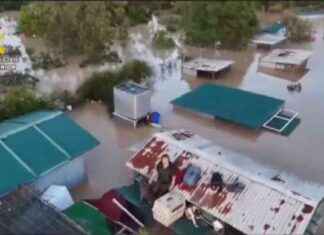“The PP and Vox would lead us to a situation of confrontation, fracture and finished territorial dialogue”, Pedro Sánchez has warned about the consequences that, in his opinion, the formation of a coalition between Alberto Núñez Feijóo and Santiago would have for the question of Catalonia Abascal in the Government of Spain after the elections on July 23. “That risk exists,” warned the head of the Executive in an interview on Radio Nacional de España.
The day after leading a rally in Barcelona, ??Sánchez has instead defended his management in Catalonia to “direct a very difficult conflict with dialogue and with respect for democratic legality.” It is the same thing that his socialist predecessor, José Luis Rodríguez Zapatero, did with the Ibarretxe plan in Euskadi, as he has highlighted, to put “a complicated, complex, difficult situation on track”.
The leader of the PSOE has once again admitted that many of his voters did not like the “risky decisions” that he has adopted in this legislature to defuse the Catalan conflict, such as granting pardons to the leaders of the process or repealing the crime sedition and embezzlement reform. Sánchez has justified that he approved these types of measures to “establish a policy of understanding and normalization of the situation in Catalonia that today is a reality.” “That justifies those very difficult decisions that I had to make at such a particular moment,” he argued.
And despite the fact that his parliamentary agreements with ERC and EH Bildu also punish him before the elections, and are one of the main arguments of the right-wing against him, Sánchez has assured that he will continue to talk with these pro-independence groups in the next legislature, if he manages to revalidate the presidency of the Government. “Of course”, he has recognized himself. “I seek votes from under the stones to advance rights and freedoms”, he has justified. For example, to revalue pensions or approve a labor reform. And he has contrasted these alliances with that of the PP and Vox “to reduce rights and freedoms.” “To advance in rights and freedoms, a pact with everyone, with whomever it takes, with whomever I can agree with,” he defended.
Sánchez, in any case, has denied that he acted at the dictates of the Catalan independence movement when deciding, for example, the grace measures for the imprisoned 1-O leaders. “Esquerra Republicana and Junts per Catalunya asked for amnesty. And what they have is a partial, conditional pardon, where the disqualification that was raised by the judicial authorities is also respected ”, he replied.
“Have we had to make risky decisions? Yes. Have we had to make decisions that, indeed, part of the Spanish, also PSOE voters, did not like? I know, I am aware ”, he acknowledged. “But many times things are explained with the facts, with the situations. And today the situation in Catalonia has nothing to do with that of 2017. Today in Catalonia the Constitution and the law are complied with ”, he defended. “We rulers have to think not so much about the elections but about the next generations,” Sánchez has settled.
That Salvador Illa’s PSC is today the leading political force in Catalonia, or that the socialist Jaume Collboni is today the mayor of Barcelona, ??are “extraordinary news”, he assured, not only for Catalonia and Barcelona, ??”but also for the Unity of Spain.
On the other hand, Sánchez has warned about the formula used by Santiago Abascal to resolve the Catalan conflict: “He has said that they solve this with slaps.” And if the PP “joins the car” with Vox, in his opinion it would lead to a situation that could replicate the 2017 scenario. “That risk exists,” he insisted.
Apart from the Catalan question, the President of the Government has rejected that the die has already been cast before the elections of 23-J. “Not at all,” he warned. In this way, he has pointed out, already in the final stretch of the campaign, that “the PSOE is coming back”, thanks also to “the greater awareness that many progressive voters have taken of the risk and the real threat that it may exist of being exported to the whole of Spain everything that we are seeing in the government agreements between the PP and Vox in certain autonomous communities and town halls ”. And also because there are sectors of the center-right electorate, who have voted for the PP on previous occasions, “who do not agree with this involution that is taking place.”
Sánchez has thus shown his conviction that after 23-J he will be able to reissue a progressive coalition government with the platform of Yolanda Díaz. “I am convinced that the PSOE is going to be the first force in the country. And if I can, I will govern with Yolanda Díaz’s party. And I also know, for sure, that the PP is not going to abstain ”, he assured. Thus, the only two possible government alternatives, he has stressed, is a coalition of Sánchez with Díaz, or a government of Feijóo with Abascal. “These are the two options,” he stressed.
The PSOE leader has insisted, in any case, on trying to mobilize the progressive vote, to reverse some polls that favor Feijóo, and has warned against “the consequences of staying at home” and not going to vote. Sánchez has assured that there is “a cascade of polls” that give victory to the PP and only seek, in his opinion, the “demobilization of the progressive electorate.” There are polls, disseminated by conservative media, that have “this intention.” And he has called for those surveys to fold their arms. “Nothing is written, we are going to play the game and we are going to win it”, he concluded.








